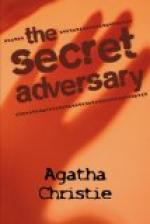A policeman produced a key. They all knew Sir James well. They had also had orders respecting Tuppence. Only the third member of the party was unknown to them. The three entered the house, pulling the door to behind them. Slowly they mounted the rickety stairs. At the top was the ragged curtain hiding the recess where Tommy had hidden that day. Tuppence had heard the story from Jane in her character of “Annette.” She looked at the tattered velvet with interest. Even now she could almost swear it moved—as though some one was behind it. So strong was the illusion that she almost fancied she could make out the outline of a form.... Supposing Mr. Brown—Julius—was there waiting....
Impossible of course! Yet she almost went back to put the curtain aside and make sure....
Now they were entering the prison room. No place for anyone to hide here, thought Tuppence, with a sigh of relief, then chided herself indignantly. She must not give way to this foolish fancying—this curious insistent feeling that Mr. Brown was in the house.... Hark! what was that? A stealthy footstep on the stairs? There was some one in the house! Absurd! She was becoming hysterical.
Jane had gone straight to the picture of Marguerite. She unhooked it with a steady hand. The dust lay thick upon it, and festoons of cobwebs lay between it and the wall. Sir James handed her a pocket-knife, and she ripped away the brown paper from the back.... The advertisement page of a magazine fell out. Jane picked it up. Holding apart the frayed inner edges she extracted two thin sheets covered with writing!
No dummy this time! The real thing!
“We’ve got it,” said Tuppence. “At last....”
The moment was almost breathless in its emotion. Forgotten the faint creakings, the imagined noises of a minute ago. None of them had eyes for anything but what Jane held in her hand.
Sir James took it, and scrutinized it attentively.
“Yes,” he said quietly, “this is the ill-fated draft treaty!”
“We’ve succeeded,” said Tuppence. There was awe and an almost wondering unbelief in her voice.
Sir James echoed her words as he folded the paper carefully and put it away in his pocket-book, then he looked curiously round the dingy room.
“It was here that our young friend was confined for so long, was it not?” he said. “A truly sinister room. You notice the absence of windows, and the thickness of the close-fitting door. Whatever took place here would never be heard by the outside world.”
Tuppence shivered. His words woke a vague alarm in her. What if there was some one concealed in the house? Some one who might bar that door on them, and leave them to die like rats in a trap? Then she realized the absurdity of her thought. The house was surrounded by police who, if they failed to reappear, would not hesitate to break in and make a thorough search. She smiled at her own foolishness—then looked up with a start to find Sir James watching her. He gave her an emphatic little nod.




